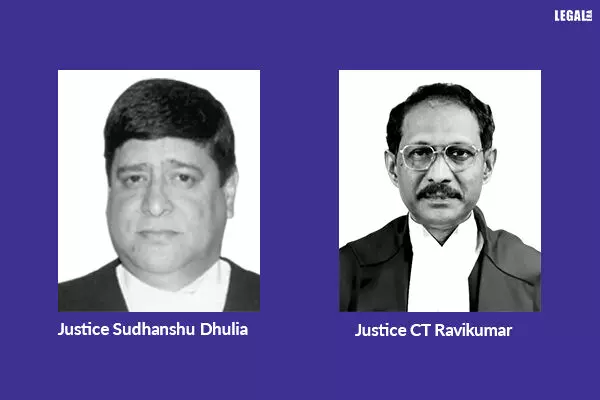- Home
- News
- Articles+
- Aerospace
- Artificial Intelligence
- Agriculture
- Alternate Dispute Resolution
- Arbitration & Mediation
- Banking and Finance
- Bankruptcy
- Book Review
- Bribery & Corruption
- Commercial Litigation
- Competition Law
- Conference Reports
- Consumer Products
- Contract
- Corporate Governance
- Corporate Law
- Covid-19
- Cryptocurrency
- Cybersecurity
- Data Protection
- Defence
- Digital Economy
- E-commerce
- Employment Law
- Energy and Natural Resources
- Entertainment and Sports Law
- Environmental Law
- Environmental, Social, and Governance
- Foreign Direct Investment
- Food and Beverage
- Gaming
- Health Care
- IBC Diaries
- In Focus
- Inclusion & Diversity
- Insurance Law
- Intellectual Property
- International Law
- IP & Tech Era
- Know the Law
- Labour Laws
- Law & Policy and Regulation
- Litigation
- Litigation Funding
- Manufacturing
- Mergers & Acquisitions
- NFTs
- Privacy
- Private Equity
- Project Finance
- Real Estate
- Risk and Compliance
- Student Corner
- Take On Board
- Tax
- Technology Media and Telecom
- Tributes
- Viewpoint
- Zoom In
- Law Firms
- In-House
- Rankings
- E-Magazine
- Legal Era TV
- Events
- Middle East
- Africa
- News
- Articles
- Aerospace
- Artificial Intelligence
- Agriculture
- Alternate Dispute Resolution
- Arbitration & Mediation
- Banking and Finance
- Bankruptcy
- Book Review
- Bribery & Corruption
- Commercial Litigation
- Competition Law
- Conference Reports
- Consumer Products
- Contract
- Corporate Governance
- Corporate Law
- Covid-19
- Cryptocurrency
- Cybersecurity
- Data Protection
- Defence
- Digital Economy
- E-commerce
- Employment Law
- Energy and Natural Resources
- Entertainment and Sports Law
- Environmental Law
- Environmental, Social, and Governance
- Foreign Direct Investment
- Food and Beverage
- Gaming
- Health Care
- IBC Diaries
- In Focus
- Inclusion & Diversity
- Insurance Law
- Intellectual Property
- International Law
- IP & Tech Era
- Know the Law
- Labour Laws
- Law & Policy and Regulation
- Litigation
- Litigation Funding
- Manufacturing
- Mergers & Acquisitions
- NFTs
- Privacy
- Private Equity
- Project Finance
- Real Estate
- Risk and Compliance
- Student Corner
- Take On Board
- Tax
- Technology Media and Telecom
- Tributes
- Viewpoint
- Zoom In
- Law Firms
- In-House
- Rankings
- E-Magazine
- Legal Era TV
- Events
- Middle East
- Africa
Supreme Court adjourns NCLT Bar Association plea on tenure fixing

Supreme Court adjourns NCLT Bar Association plea on tenure fixing
The matter will be heard on 20 July
The Supreme Court has adjourned the writ petition filed by the National Company Law Tribunal Bar Association that challenged the notification of the Ministry of Corporate Affairs fixing the NCLT members' tenure at three years.
A Vacation Bench comprising Justice CT Ravikumar and Justice Sudhanshu Dhulia observed that the locus standi of the petitioner was the first issue, which had to be considered in the matter. It held that none of the members, who accepted the appointments based on the three-year term, challenged the notification.
The bench noted that the issue of whether the members could continue beyond the term of three years could be decided in the petition if the issue was answered in favor of the petitioner.
The apex court also declined the request of a judicial member of NCLT, who requested the court to let him make the submission in the plea filed by the Bar Association. The court asked him to file an application for the intervention before making any submissions.
Irked by the request, Justice Ravikumar questioned, "Do we have to tell this to a judicial member? We don't want to embarrass you."
Last week also, the top court had adjourned the NCLT Bar Association's plea. The bench comprising Justice JK Maheshwari and Justice Hima Kohli court was miffed because the Counsel for the Corporate Affairs ministry had shared only one copy of the minutes of the committee meeting with the two judges.
The Solicitor General Tushar Mehta had then apologized to the bench for the mix-up and offered to file the copy of the minutes in a sealed cover.
Appearing for the Bar Association, Senior Advocate Maninder Singh objected to the sealed cover saying that it should be shared with the Bar before the Supreme Court.
The court had issued a notice on the plea against the fixing of the tenure of NCLT at three years while seeking direction to increase it to five years. But the petitioner argued that the early leaving of the members would lead to several seats becoming vacant. It would increase the pendency of the cases.
The petitioner further argued that the notification was in violation of the Supreme Court judgment in the Madras Bar Association Vs Union of India & Anr, wherein it was said that the tenure would be five years.
The Counsel also submitted that the three years tenure was very short, as by the time a member would attain the required knowledge, experience, and expertise, his tenure would expire.



